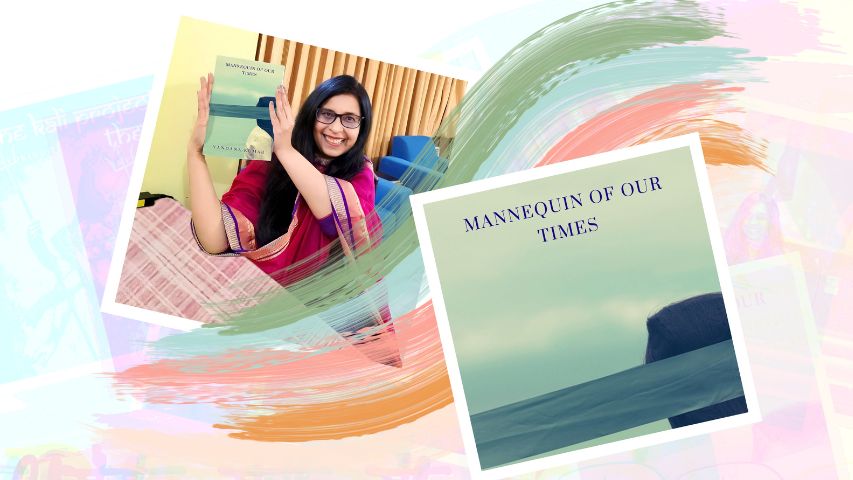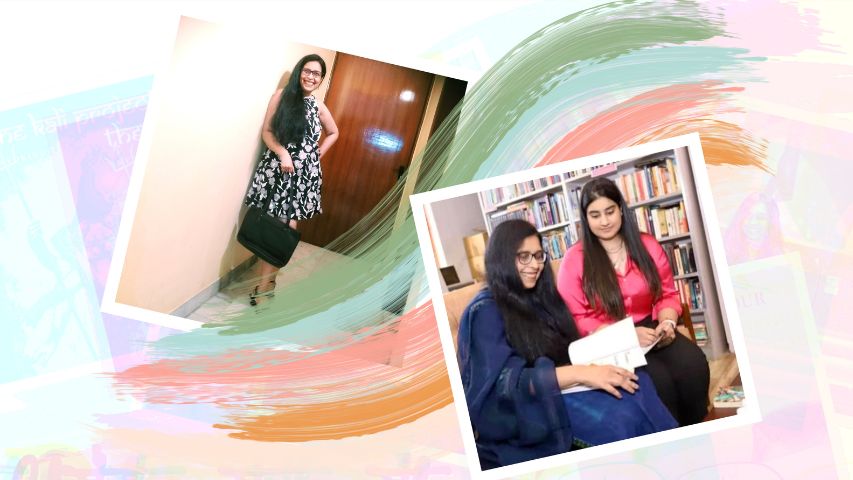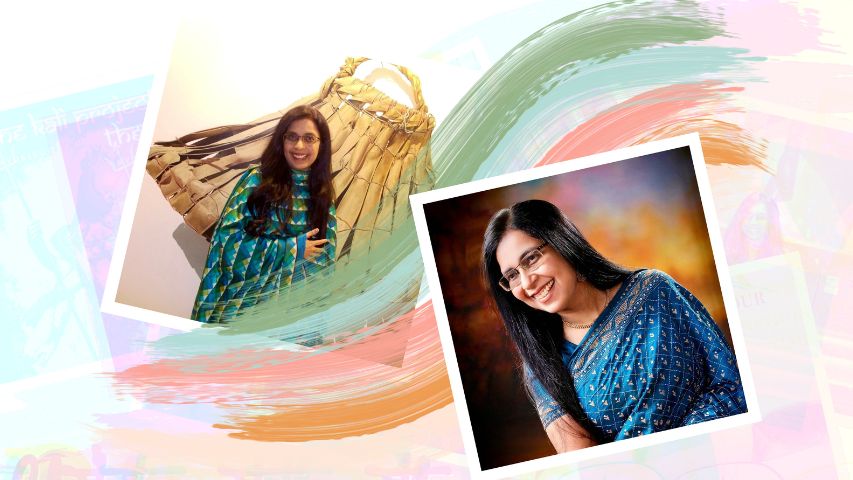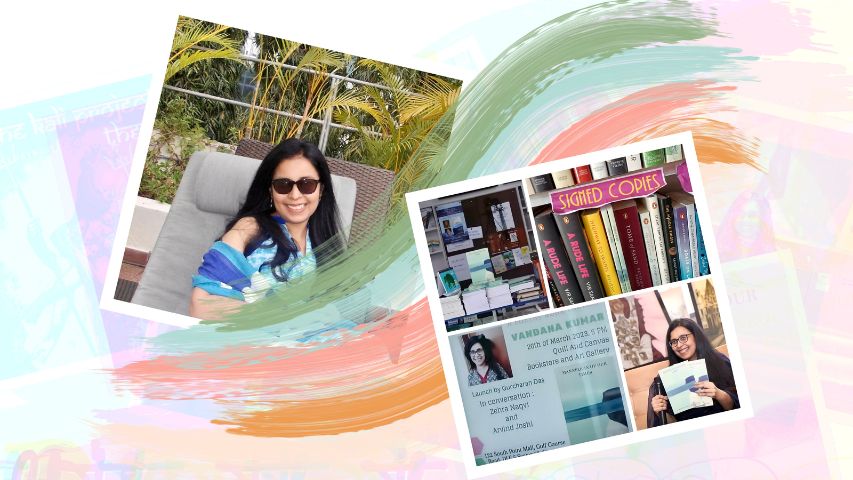-853X543.jpg)
I WOULDN’T HAVE IT ANY OTHER WAY!
by Vinta Nanda April 28 2023, 12:00 am Estimated Reading Time: 16 mins, 55 secsVinta Nanda explores the making of a poet, reaching nowhere obviously, because ‘if we knew what makes a poet, everyone would be one, isn’t it?’ in this interview with Vandana Kumar.
Vandana Kumar is a French teacher, recruitment consultant, Indie film producer and poet residing in New Delhi, India. Her poems have been published in several national and international websites like ‘Mad Swirl’, ‘Scarlet Leaf Review’, ‘North of Oxford’, ‘Grey Sparrow Journal’, ‘Lothlorien Poetry Journal’, ‘The Piker Press’, ‘The Flying Dodo’, ‘Destiny Poets’, ‘Outlook’, ‘Madras Courier’, ‘Glomag’ etc.
She has featured in literary journals like ‘Fine Lines’ and anthologies like ‘Harbinger Asylum’, ‘Kali Project’ (‘Kali Project’ is now in the ‘North Carolina Regional Library’), ‘But You Don't Look Sick’ and more. Indie Blu(e) Publishing featured her as one of their authors on their website.
She was a jury member for the ‘All India Poetry Competition’ organized by ‘Cocoa-Butter’ and also co-edited their debut print anthology that resulted from this competition. Her cinema articles can be found on websites like ‘Just Cinema’ and ‘The Daily Eye’. Her debut collection of poems ‘Mannequin Of Our Times’ was published in February 2023.
And, intrigued by this multi-faceted poet, writer, journalist, columnist, teacher and film producer, knowing so little about her after having edited some of her deep retrospective and insightful pieces on world cinema, I decided to interview her soon after the release of her collection of poems. I thought I had asked her difficult questions, leaning heavily on abstract for support, because interviewing a poet whose work I’m fascinated by is a first for me - but upon receiving her answers, I realized how simple they were for her to answer.
She sent me the following message, which I’ve made prelude to her interview. She said, “Before I answer your questions, I want to thank you, Vinta, for taking time out to interview me. It is beyond humbling. I must compliment you on the lovely questions you have framed and all the thinking it made me do. I wouldn’t have it any other way”.
Over to this wonderful woman then…
Who are you?
This is one of those questions that tends to go all over the place simply because of the zillion ways it can spread itself – from the literal to the figurative – from the physical to the metaphysical. All our ‘journeys and destinations’ and all our ‘angst and soul searching’ if we really scratch the surface of this question here.
At an obvious level one could say ‘I am a French teacher, translator, cinephile, Indie film producer and poet – and in no particular order’. But that’s not the ‘Who are you?’ that you are asking of me. Perhaps I am just yearning to find myself. I am trying to find something worthy of doing – gravitating towards any art that appeals – anything that connects. At a personal level I am just wanting to belong.
And I quote from one of my poems, ‘A place on my body’
There aren’t many places unmarked/On this body of mine/A body with a longing/To mean something/To someone/To be someone’s somebody.
I love the fact that each day I am progressively unsure of who I am. Wanting to know, is my journey. So, I would say philosophically to those who ask me who I am…
I know not who I am/For if I knew/I would be an envelope in the hands of a postman/Of a street/With a definite address for delivery//I would be a full stop in the sentence/That hasn’t yet been framed//I know not who I am/Do you?

As a poet, your evolution has been beautiful – from putting words to your thoughts, to getting published because a friend took it in her hands without telling you, and sharing your poetry with a journal, to becoming a part of festivals and poetry wagon worldwide, and to finally having your work published. Tell us in your own words what it was like?
The feeling is inexplicable. I was writing, as I mention in my book, to fill the void that my father’s death had left inside. But maybe that was his blessing and his way from up there to ask me to start writing. Along with loss, death and seasons that consume my thoughts regularly, I was writing about a lot of other things – erotic stuff, dark and wicked humor, thoughts on consumerism, alienation and how social media makes us feel. All these things when I wrote, I had no idea that they were worthy of publishing – I was sharing thoughts with friends the way one says, “Today I went out for dinner with XYZ”.
So, from that point, just sharing my thoughts to becoming a part of a literary circle where one gets invited to festivals or to ‘contributing to anthologies’ is overwhelming. A very emotional connection happened when I was interviewed by ‘Candice Louisa Daquin’ (Little did I know she would later become the editor of my debut collection) of ‘Indie Blu(e) Publishing’ as one of their featured authors on their website. This interview is another landmark as the first one after the publication of ‘Mannequin Of Our Times.’
The getting published part would have been easy if one went the self-publishing route but financial constraints apart, I just wanted my work to have a different sort of credibility. One third of the poems are those that have been published in websites and journals of repute. This is an advisable ratio according to my publisher, ‘Dustin Pickering’. Self-publishing too has a lot going for it. There are brilliant works that no publisher touches with a bargepole and they get published, so self-publishing empowers you in that sense.
When I teamed up with Anshuman Gaur and Sharad Raj – as judges for an ‘All India Poetry Competition’, it was a wonderful experience. We used a big self-publishing house to publish it and that was such a good thing – as it gave us the opportunity to tap talent from all over the country including entries from remote villages.
For my debut collection, I was very sure I wanted to be traditionally published or by a small independent publisher. For someone to say, “Look we like your work…we aren’t charging you a penny, not one Penny! – but will back you all the way”.
Having also been editor of the ‘All India Poetry Competition Anthology’, I can say that I have seen both traditional and self-publishing from very close quarters. Most self-publishing outfits have these packages – the bigger the package, the more marketing and visibility you get. Also, most self-publishing units get your book released really fast.
Traditional publishers and independent publishers are not in that sort of hurry. Having a professional editor on board also adds to it. They have their credibility at stake. I can say without an iota of exaggeration that there must have been over a hundred mail exchanges (if not two hundred), in total, from the day of deciding to go with the publisher. It was a process – signing the contract, getting blurbs, forewords, front/back cover layouts, to the poetry formatting and eventual distribution and marketing concerns. I was fortunate to have got a fine publisher who is not just a great human being but an outstanding poet.

Language, words, vocabulary, expression – what do these things mean to you?
Take language – as a language teacher I daily harp on the necessity for students to equip themselves with words and have a rich vocabulary. Limited vocabulary naturally means limited expressions or restricts one’s way of saying things – but that also might not be the case always.
There is no denying the power of images as sheer poetry. One has only to visit some classics of silent cinema and the beauty that they expressed without words. Take Charlie Chaplin’s ‘City Lights’ (1931) – the scenes when the tramp falls for the blind flower girl, or take what Renée Jeanne Falconetti makes us feel in Carl Theodor Dreyer’s 1928 classic, ‘The Passion of Joan of Arc’. Eyes communicating have a language of their own. Poetry itself talks so much about ‘Naino ki bhasha’ (the language of the eyes). Eventually it is about evoking an emotion – expression can be anything…nonverbal too.
Poetry need not be a vocabulary show. Take Hafez, Rumi, take Khalil Gibran – there is pure philosophy in the simplest language. The language would be understood by even a 6-year-old, but it would take a lifetime to truly get the philosophy, the darkness and the pain. Then there are famous poets who write gorgeous poetry albeit with language that is difficult to comprehend by one with limited vocabulary. So, vocabulary is needed and yet not an essential criterion to say someone is an excellent poet.
Share a piece of your work that is especially close to your heart and tell us why?
Some pieces are close to my heart at one time, at other times - other pieces. Then again some are a constant. So, sharing this piece that was published in ‘The writing Disorder’ in the March of 2022 and also features in my book – Mannequin Of Our Times: ‘Nothing Happens’
Nothing happens really in this city/Where everything has already transpired/It is night/Nobody is up/Asking questions/Or staring at the moon//The generation that argued/Wanted freedom/Did not fight enough/Suddenly packed bags instead//The little kids in the neighborhood/Are a little too little/Their noises are too basic/The kind that/Children make/Demanding/Crying for food/Or for sleep//The noise of defiance/And angst/Has left the place/The nights are moist/With boredom/And yet it doesn’t rain//No smell of first love/No awkward teenagers asking/Each other out/Talking of movies first/Then plays/Then genres of books/Asking names of favorites/All the while wondering/How and when/To touch each other//The city has only the silence/Of status quo/We know our daily visitors/And our weekend guests/Even though/We ask them to sign in/Each time/At the entrance gate//This isn’t a place anymore/Where rebellion grows under the nails/Like a garden/Where a new strange bird/Sits on a windowsill/Every now and then/One that you keep admiring/As you figure out its name//This isn’t the sort of place/Where magic happens/Where/Fireflies dance/Where the month of July/Could happen at any time of the year/Where it isn’t about its natural progression/Into the month of August//And in the quiet of the night/Love isn’t enough a force here/To overwhelm/The city has its center/And its suburbs/And I can’t tell one from the other.
The reason why this particular poem is very close to my heart is simply that it has a lot of elements and themes that reoccur in my poems – here they are there all together. The recurring theme of darkness – as in both the void within us and sometimes the urban loneliness. The poem talks of a certain sadness about losing our voices and not protesting enough – whether teenagers or adults. We are leading lives dictated by the neoliberal paradigms of success. There is reference to the gated communities and heightened securities. (For all of that, crime is on the rise).
The poem also alludes to the lack of imagination in a routine life – as fireflies have stopped to dance and July can happen at any time of the year.

Your knowledge of cinema is vast, and you write about it so regularly. Tell us about where your love for cinema started – from what I recall from some articles written by you, your father had a hand in making cinema a passion?
Thank you for that compliment. I have enjoyed all the pieces that I have written for ‘Just cinema’ and ‘The Daily Eye’. I try submitting an article once in two months as I thoroughly enjoy them. This took a backseat for a bit once I signed the contract for my book with the publisher. Every free hour that I managed after my regular teaching was devoted to the making – from the editing, the choosing the final title, the cover designing to getting the foreword and blurbs written.
My father definitely had a hand in this passion for cinema that I carry. Sharing something that I had not spoken of in that article you mentioned: During school and college year end examinations, I would be burning the midnight oil and tiptoeing towards the kitchen for a midnight snack, for fear of disturbing my parents – only to find them wide awake!!! Baba and Ma would be in the middle of some discussion on a Talat Mahmood and Lata Mangeshkar duet or discussing the finer aspects of a Billy Wilder film or jostling their collective memories to remember the films in which Frank Sinatra and Gene Kelly starred. This was naturally pre-internet and so the only search engines available were the cinema books in the library. I can say without exaggeration that the cinema books constituted more than 65 percent of my father’s library – hard core literature, cricket, comic books, thrillers etc. all made for the other 35 percent. Anything else I mention would be a repetition of that article. Undeniably the strong influence and the beginning of this love affair was at home before anything else outside.
For readers:
Here’s Vandana Kumar’s piece That’s Entertainment: https://thedailyeye.info/in-the-news/that-s-entertainment/470ddb40e9b76bb6

I've often wondered what it is that makes a poet – help me understand.
If only a poet knew what makes him or her a poet. It is the lifelong journey for a poet – for any artist to reach somewhere. Sometimes it’s about the realization at the end of the journey – mostly it is about the revelations on a daily basis in this journey. A lot of inspirational sermons are being passed off as poetry. They end up sounding familiarly like the advice accompanying those good-morning WhatsApp messages. They might win you awards and acclaim but how much of it is poetry remains debatable.
The positivity or learning or healing has to come from within the darkness. The poet is a universal one, yet he or she is also a poet of his or her gender or his particular class/caste and country. So many identities go into what one writes - consciously or unconsciously. Many things go into his/her making. It is complex and often not understood by the poet himself, a lot like poetry itself. Is the poet writing to satisfy his personal whim or is it transcendental? Somewhere a deep spiritual core has to be there.
Tell us about the films you've co-produced and the many other things that occupy you?
People ask me what made you co-produce two films. So, to cut a long story short it is because the films concerned, ‘Ek Betuke Aadmi Ki Afrah Raatein’ (The Joyous Nights of A Ridiculous Man) and ‘Weekdays & Weekends’ (2023), both drew me in right from the very first narration. I saw in them a cinematic sensibility, profound conversation and poetic images. ‘Sharad Raj’, the director, and I had met in a Cinema group on Facebook and bonded over our common interests on Cinema, music and a similar world view. I organized the promo funding for ‘Ek Betuke Aadmi Ki Afrah Raatein’ as well as took a major initiative in the crowd funding effort. For ‘Weekdays & Weekends’ I got the entire funding organized.
One knows all about how studios operate and obvious markets for a certain kind of cinema. There is a deep, meaningful cinema that is on the margins and always has been. Mostly the financial constraints and lack of backing make them films that remain just a story in the head, just a script registered – and a wishful ‘if only I could have made that film’. I just felt that if efforts have to be taken, they must. As TS Eliot says “Only those willing to take the risk can see how far they can go.”
Last, where are you headed from here, and how do you plan to do all the many things that you do, simultaneously?
Quoting Emily Dickinson from her poem ‘Future never spoke’: The Future never spoke/Nor will he like the Dumb/Reveal by sign/a Syllable/Of His Profound/To Come.
I actually don’t have any clichéd plans. The many things one does simultaneously just happen. The poetry does come often while taking a shower – the way one talks of bathroom singers. Poetry happens while teaching in a French class. I do make it a point to note it down later. Sometimes it isn’t a worthy thought enough to linger – so it does not. Other days those lines that came out of apparent nowhere (though nothing comes from nowhere) stay for weeks and come into a word document exactly the same way.
I play the keyboard to unwind and it’s a dream to compose something someday. Who knows? The way I never dreamt my poetry would get this far. Cinema articles are decided the minute I fall in love with a film. I pause the film and make short notes and continue. I feel that this is something that has to be written. It’s an overwhelming urge to write what I find poetic in the film. I do not just send any cinema piece because it has to be sent – only if it is a love affair. Similarly with my poetry – I can’t respond overtly to calls for writing a poem on a particular day. Poems that fit in and have been submitted for a Woman’s Day theme, were perhaps, written in October.
There is no pressure that I feel when I do things simultaneously, to do them simultaneously and no regrets when I don’t do things simultaneously. I love all those anti-capitalist quotes that are so telling about the pressures that ‘to do lists’ put on us - the targets and definitions of success leave question marks.
There may be days on end when I don’t have the urge to lift a finger and it might be a huge stretch when I just keep writing poetry, writing my articles, writing something exciting in French. I am planning a book on creative writing in French for the school level. How to go beyond stereotypical ways of writing letters, messages etc. The schools say that this has to be written in this way for this particular topic and then it is memorized for the board exams. So, something related to the syllabus yet going beyond in terms of creativity. Also, I would love to be a part of some experimental film where images and my poetry come together.
Where am I headed? Who knows the good roads from the bad...that won’t stop me from taking them…Who knows which autumn leaf will fall at his/her feet?...





-173X130.jpg)
-173X130.jpg)
-173X130.jpg)
-173X130.jpg)
-173X130.jpg)

